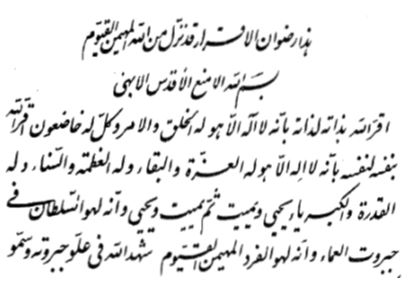
Lawḥ-i Riḍwān al-Iqrār
(The Tablet of the Riḍwān of the Enthronement)[1]
Translation Stephen N. Lambden 01-09-2013...
In progress, last revised 27-06-2015.
This scriptural Tablet of Bahā’-Allāh opens with an extended version of the basmalah formula favoured by the Bāb in his Persian and Arabic Bayāns (see III:11). It was written during the latter part of the Edirne [Adrianople] period (1863-1867) and was addressed a Nabīl or Muhammad who is probably to be identified with the poet, historian and apostle of Bahā’-Allāh, Mullā Muhammad Nabīl-i Zarandī (d. 1892 CE). In its opening prescript it is entitled Riḍwān al-Iqrār which may be translated `The Riḍwān of the Establishment’ implying the eschatological enthronement of its author, Bahā’Allāh, upon the Divine Throne (al-`arsh). This would seem to be symbolic of his having occupied a position of authority at the commencement of his April-May 1863 declaration during a twelve day period subsequently referred to as Riḍwān.
Text translated from INBMC 83:92-100 + AQA XX:180-192
This [Tablet] is the Riḍwān al-iqrār, The Riḍwān of the Enthronement, which hath indeed been sent down from God, the Help in Peril, the Self-Subsisting.
[0]
In the Name of God,
the Inaccessible (al-amna`), the Most Holy (al-aqdas),
the All-Glorious (al-abhā).[2]
[I]
[1] God taketh His seat [upon His celestial Throne] by virtue of His Essence which is operative through His Essence (bi-dhātihi li-dhātihi) for He, no God is there except Him. [2] Unto Him belongeth the creation and the Command (al-khalq wa'l-amr). [3] All are humbled before Him. [4] God taketh His seat [upon His celestial Throne] through His Logos-Self, by means of His Logos-Self (bi-nafsihi li-nafsihi) for He, no God is there except Him. [5] Unto Him belongeth the [Divine] Might (al-`izzat) and the Eternal Permanence (al-baqā').
[6] And for Him is the [Divine] Greatness (al-`aẓimat) and the [Divine] Splendor (al-sana'), for Him is the [Divine] Power and the [Divine] Grandeur (al-kubriyā). [7] He giveth life and He causeth to die then again causeth to die and [once again] giveth life. [8] He indeed is the Sovereign (al-sulṭān) in the Omnipotent Realm of the theophanic [Divine] Cloud (jabarut al-`amā'). He assuredly is the Matchless (al-farḍ), the Help in Peril, the Self-Subsisting.
[9] God doth indeed testify from the exaltedness of His Omnipotent [Empyrean] Realm (al-jabarūt) and the loftiness of his Own Kingdom (al-malakūt) that there is none other God save Him. [10] His is the Elevatedness (al-rafa`at?) and the Power (al-quwwat), the Might (al-`izzat) and the Omnipotence (al-qudrat) which descendeth from the heaven of the Divine Bounty (samā’ al-faḍl) such that the realities of all things (ḥaqā’īq kull shay’) are purified thereby. [11] Such is realized through the agency of the Spirit (jihat al-rūḥ) [AQA 4: 43/ 420] which in no wise allows escape therefrom. [12] Wherefore was the Command [Cause] (al-amr) sent down from the Empyrean of Eternity (jabarūt al-baqā’) for the people of Bahā’ (ahl al-bahā’) perchance all humankind (al-nās), might, in the Days of their Lord, be given to mindfulness.
[II]
[1] So praised be unto He Who
[1] Alternatively, the Lawḥ-i Riḍwān al-iqrār, the Tablet of the Paradise of the [Celestial] Establishment [upon the Divine Throne).
[2] Note here that Bahā-Allāh uses an extended version of the Bab's new apophatic basmala consisting of three Arabic superlatives



